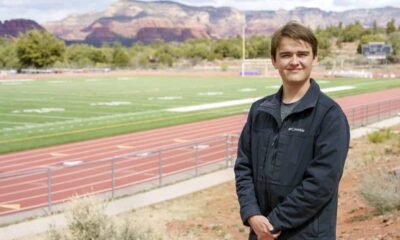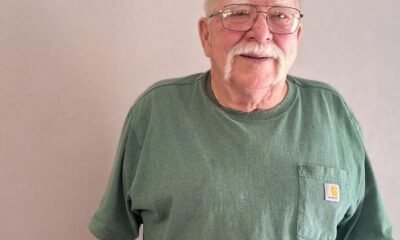Business
Homelessness Meets Spiritual Quest: A Journey of Finding Peace

In Sedona, perspectives on van life and homelessness vary widely. For individuals like Jesse Clutterbuck, it’s a practical response to economic hardships, while others, like Zack Martin, view it as a journey of self-discovery and spiritual growth.
“Many people desire to escape societal norms,” Martin expressed. He described how his path diverged from traditional expectations, motivating him to relinquish attachments to material wealth and societal validation.
Originally hailing from Ohio, Martin arrived in Sedona in 2017 during his travels across the country. “I grew up poor, so exploring the nation was a revelation,” he recounted. Through this journey, he sought a deeper understanding of himself and his faith, ultimately leading him to Sedona—a place he found conducive to introspection.
“Sedona offered the perfect environment for inward exploration,” Martin explained. This choice allowed him to focus on personal growth without the stress of conventional employment. He noted, “I can turn my attention inward instead of worrying about bills.” His philosophy emphasizes redefining value beyond mere financial metrics.
Martin introduced the concept of a “garden mentality,” suggesting that abundance exists for those willing to embrace it. He authored a poem in 2017, which evolved into a children’s book, reflecting his quest for simplicity and liberation from societal pressures.
Avoiding panhandling, Martin expressed, “I didn’t want to feel needy.” Instead, he engaged actively within the community, sharing insights to inspire others toward liberation. His relationship with Wayside Chapel played a significant role in his moral evolution.
“Pain often propels individuals to seek solutions,” he observed. Acknowledging challenges from past relationships, Martin learned to prioritize spiritual connections over romantic ones.
When asked about resources for those experiencing homelessness, Martin emphasized the necessity of community support rather than conventional shelters. “People who work and live in their cars need safe parking, not temporary solutions,” he stated.
He also recounted the efforts of a friend, Jesse Russo, who created a network for distributing food and goods to those in need. “She transformed her garage into a hub for assistance,” Martin praised. This initiative fostered a sense of community and comfort among individuals facing homelessness.
Martin indicated that many in Sedona enjoy a certain level of comfort despite their circumstances, citing the favorable weather and available resources. He shared a personal experience regarding how law enforcement treated him with leniency during his time living on the streets.
In an ironic twist of fate, his journey into homelessness ultimately led Martin to stability. While on a trip to New Mexico, he met his future wife, who was also navigating life from her van. Their shared experiences deepened their connection, leading to marriage last September and the birth of their daughter.
Recently, they transitioned from living in their vans to a home purchased by her father. Martin described shifting towards a more grounded life, creating a business focused on landscaping, born from his desire to help others.
Reflecting on the transition, he shared, “Would I trade my home for life on the streets again? Absolutely not, but I know I could, if called.” Martin’s journey illustrates the complex relationship between material possessions and spiritual fulfillment.


















